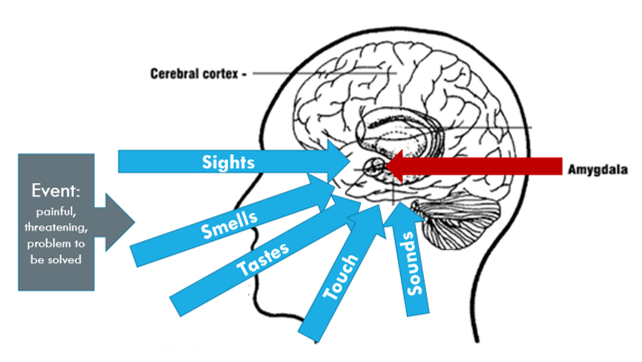Substance Use Blog Series: Stress and Substance Use
Sept. 16, 2020

This week’s Substance Use Service Blog post will be the last of our regular posts. We hope you have found them informative and useful. If you have any questions or concerns about any of the posts, please call the Deltassist Substance Use Services line at 604-594-3455 ext. 108
In today’s post we are covering stress and substance use. Chronic and developmental stress (that is, stress experienced during childhood and adolescence) are well established risk factors for developing substance use problems. Stress is also often reported as the leading cause of returning to use after an attempt at sobriety. It is a significant challenge for people reducing their substance use or working towards abstinence[1].
The following short (3min) Psych Hub Education video reviews some of the warning signs that substance use is becoming a problem and some things that can help. It was created for health care workers specifically because of the stress they are going through with the Covid-19 pandemic, but the information is applicable to anyone.
This post will cover:
- What stress is
- The influence of substances on our stress systems
- Coping with stress
Part A. What is stress?
The experience of stress is actually a number of things happening in our bodies after we have sensed an external threat or challenge. Symptoms of stress are signs that our bodies are preparing us to be in prime condition to address the problem.
While the word threat may immediately bring up thoughts of physical danger, our stress response is also signaled by threats to our sense of effectiveness, beliefs about ourselves or the world, and social threats (such as fear that we will be rejected, judged, or disliked).
Our bodies responses to the external situation are based on the level of perceived threat. Our fight-flight-freeze reactions are the stress system’s more extreme responses, getting us ready to respond to threats to our safety.
Two take-away points about stress are that:
Symptoms of stress are natural.
A certain amount of stress can be good for us.
*****************************************************

(Image of the brain adapted from: National Institutes of Mental Health, National Institutes of Health / Public domain, wikicommons)
The amygdala, pointed out in the image above, is the first part of the brain to receive sensory information from each our 5 sense. It also sets off our brain’s alarm system, signaling our stress system to kick into gear. That alarm can go off before we have even had time to think about what we’ve sensed.
When the amygdala perceives the threat to be relatively safe, the stress response system engages at a level which helps us tune out distractions and focus on resolving the threat or challenge. It also gives us a feeling of motivation or energy.
When the threat is more serious, we  may notice more significant physical responses as our stress system rises to the level of fight/flight/freeze. We may experience a surge of adrenalin or shaking. Physical systems that are not needed for running away or fighting, like our digestive and urinary systems, shut down. This is why we sometimes urinate or defecate when we are scared or startled.
may notice more significant physical responses as our stress system rises to the level of fight/flight/freeze. We may experience a surge of adrenalin or shaking. Physical systems that are not needed for running away or fighting, like our digestive and urinary systems, shut down. This is why we sometimes urinate or defecate when we are scared or startled.
When the threat has passed, our bodies’ relaxation systems kick-in to help us calm down and bring our other systems back online. As we relax, our heart rate and breathing slows, and we tune-in again to more of what’s going on around us, rather than being focused on the threat or challenge.
While this stress system is incredibly useful during times of danger and need, chronic stress, or prolonged severe stress, can be uncomfortable, exhausting, and cause both mental and physical health problems.
Symptoms of chronic stress include:
- headaches
- stomachaches
- muscle aches and tightness
- heart disease / heart attacks
- insomnia
- feeling drained
- irritability, short tempered-ness, anxiety
Part B. The influence of substances on our stress systems:
Depressants like alcohol and opioids relax us. When we take depressants, we are less likely to be bothered by typically stressful situations  because we are artificially relaxed. If we are experiencing chronic stress from thoughts or feelings of despair or hopelessness, these feelings may also be temporarily relieved.
because we are artificially relaxed. If we are experiencing chronic stress from thoughts or feelings of despair or hopelessness, these feelings may also be temporarily relieved.
Stimulants like crystal meth and caffeine engage our stress system, creating an artificial sense of mastery and control. We believe we are powerful enough to overcome threats and therefore feelings associated with the flight level of stress response – such as anxiety and fear – diminish or disappear. Feelings of despair or hopelessness may also be overcome by the feelings of mastery and control.
Because substances ease uncomfortable symptoms of stress, they offer what can seem like simple, quick fixes to feelings of stress. However, there are many complications and dangerous side effects to easing stress with substance use.
Engaging in impulsive behaviours while on substances, hangovers, and other forms of withdrawal all cause stress after the initial relief provided by the substance is over. An additional danger of illegal substance use is our inability to determine the exact components and dosages of what they’re made of – exposing those who use them to the possibility of lethal overdose. To read more on overdose prevention see our previous posts on the topic here and here.
Long-term affects of substances on our stress system:
Long-term use of substances can cause both our stress and our relaxation systems to become rewired. Our bodies our constantly wiring themselves to maintain balance, so when a substance that causes stress or relaxation repeatedly enters our bodies, we adjust to the new balance by reducing or no longer producing our natural chemicals that run these systems automatically.
 When we stop taking substances it takes time (sometimes weeks or months) for our bodies to rewire back to our pre-substance use state. This kind of rewiring does not happen with the single use of a substance but happens when our body is exposed to the chemical regularly over time.
When we stop taking substances it takes time (sometimes weeks or months) for our bodies to rewire back to our pre-substance use state. This kind of rewiring does not happen with the single use of a substance but happens when our body is exposed to the chemical regularly over time.
Additional stressors during recovery:
We can expect additional layers of stress with the many other life-changes that come with stopping or reducing substance use.
It is much easier to relax when we are doing things that we know well and are good at than it is when learning something new or challenging. Having to work at skills we aren’t automatically good at engages our stress system. Additionally, when we are not operating at the level of effectiveness we’d like to be while we are learning new things, our brains may perceive feedback from others to be threatening.
It’s easy to mentally dismiss the many life challenges that can come with recovery, but it is a time when we may be particularly vulnerable to feeling stress (due to our body’s rewiring our systems) and each of the seemingly small challenges can add up to long stress filled days.
It is no wonder that stress and unexpected stressful events are leading causes of returning to use after a commitment to sobriety.

Take a moment to think of all the additional stressors that can be involved with making a lifestyle change as significant as reducing substance use or becoming abstinent:
- Starting a new job
- Starting new social relationships
- Changing old relationship patterns
- Finding new hobbies
- Acknowledging mistakes made in the past
- Addressing financial challenges
- Coming face to face with stressful situations we were avoiding through substance use or that were being hidden by substance use
Because of how events can add up, it is important to check-in with our bodies to see if we are showing signs of chronic stress, even when we aren’t expecting the things we are doing to cause us stress. We can check-in with our bodies by setting aside time everyday to scan ourselves for muscle tension, shallow breath, headaches or stomach issues.
Part C. Coping with Stress
Stress management practices can be useful in preventing substance use problems as well as for coping with all the stressors related to changing our use. The following image categorizes stress management techniques into 4 groups. Although it specifically mentions stress and anxiety, the activities can also help with stress activated anger.

Click the image to enlarge it. Find the source and printable versions at: https://www.nicabm.com/four-core-strategies-for-managing-stress-and-anxiety/
It’s important to remember that implementing stress management activities can be challenging. Our stress system does not become rewired overnight or by going on a run once. Trying these activities is not about doing something right or successfully the first time, it’s about building a life that supports a healthy balance of stress and relaxation over time.
 Stress management activities can supplement other helpful activities you are engaging in but thinking in terms of stress may not be useful for you at this time, or even ever, and that’s ok too. We specifically encourage you to find a good support network of people who understand addiction. It can be a great help to connect with people whom you feel understand you and whom enable you to speak about what is troubling you daily. In addition, supportive people can recognize our “blindspots” and signs we may be heading for trouble.
Stress management activities can supplement other helpful activities you are engaging in but thinking in terms of stress may not be useful for you at this time, or even ever, and that’s ok too. We specifically encourage you to find a good support network of people who understand addiction. It can be a great help to connect with people whom you feel understand you and whom enable you to speak about what is troubling you daily. In addition, supportive people can recognize our “blindspots” and signs we may be heading for trouble.
That being said, here are some activities that can help us cope with stress and reach a balance of stress and relaxation in everyday life:
- Exercise. Exercise has many positive affects on our stress system. If we are physically strong our amygdalas are less likely to perceive external events as threatening. Also, if we have built up tension in our bodies, exercise can help us release that stress and achieve a more relaxed state. Therapistaid.com has a helpful handout here on incorporating exercise into your daily life.
- Yoga and Meditations Practices. Yoga and meditations, specifically mindful meditations, direct our attention to our bodies and help us discover where we may be holding stress. Check-out Deltassist upcoming groups page or call the Substance Use Services line at 604-594-3455 ext. 108 to find out about any programs courses on these topics. There are many free videos on yoga and meditation on youtube.
- Mindfulness Based Stress Reduction is a specific 8 week course that has been shown in many research studies to reduce participants stress levels. Read more about it on the HealthLinkBC website here. A free online version of the course is available at Palouse Mindfulness here or you can search online for a local offering of the course.

- Laugh. Make it a regular habit to spend time with someone who makes you laugh, or to watch or listen to something funny. Laughing has been shown to activate our relaxation system [2].
- Plan to relax. Taking time each day to do something relaxing to readjust from whatever stress has occurred during the day. Many self-care activities also offer opportunities for our bodies to relax. Read more about self-care in our previous post here.
- Breathing exercises. We can activate our relaxation system when we are experiencing stress by taking our attention to our breath and purposely slowing our breaths down. The website anxietycanada.com has written and audio descriptions on some great breathing exercises for relaxation.
- Organize our daily routines. Our bodies are less stressed when we do the same activities repeatedly and are not met with too many surprises. Click here to go to a PDF worksheet of Time Management Tips from Therapistaid.com
To wrap up, here is a short (2min 23 secs) video by the BBC that reviews many of the points about stress mentioned in this post:
.
.
[1] https://www.psychologytoday.com/intl/blog/science-choice/201705/stress-and-addiction
[2] https://www.mayoclinic.org/healthy-lifestyle/stress-management/in-depth/stress-relief/art-20044456
Sock images on this page from pixabay.com.








